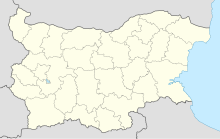
Back تفجير حافلة بورغاس 2012 Arabic Терористичен акт на летище Бургас Bulgarian Anschlag am Flughafen Burgas German Τρομοκρατική επίθεση στο Μπουργκάς Greek Atentado terrorista en el aeropuerto de Burgas Spanish بمبگذاری اتوبوس ۲۰۱۲ بورگاس Persian Attentat de Bourgas French הפיגוע באוטובוס בנמל התעופה בורגס HE Ահաբեկչություն Բուրգասում Armenian Attentato di Burgas del 2012 Italian
| 2012 Burgas bus bombing | |
|---|---|
| Part of Iran–Israel proxy conflict | |
 Location of the bombing (near Burgas Airport) | |
Burgas Airport (Bulgaria) | |
| Location | Burgas Airport, Burgas, Bulgaria |
| Coordinates | 42°34′00″N 27°31′13″E / 42.56667°N 27.52028°E |
| Date | 17:23, 18 July 2012 (UTC+03:00) |
| Target | Israeli-operated buses |
Attack type | Suicide bombing |
| Weapons | Unknown explosive device |
| Deaths | 7 (including the bomber) |
| Injured | 32 |
| Perpetrator | Mohamad Hassan El-Husseini[1] |
The 2012 Burgas bus bombing was a terrorist[2] attack carried out by a suicide bomber[3] on a passenger bus transporting Israeli tourists at the Burgas Airport in Burgas, Bulgaria,[4] on 18 July 2012. The bus was carrying 42 Israelis, mainly youths,[5] from the airport to their hotels, after arriving on a flight from Tel Aviv. The explosion killed the Bulgarian bus driver and five Israelis[6] and injured 32 Israelis, resulting in international condemnation of the bombing.
In February 2013, Tsvetan Tsvetanov, the Bulgarian Interior Minister, said there was "well-grounded" evidence that Hezbollah was behind the attack.[7] Tsvetanov stated that the two suspects had Canadian and Australian passports and lived in Lebanon.[8] According to the Europol, forensic evidence and intelligence sources all point to Hezbollah's involvement in the blast. Both Iran and Hezbollah have denied any involvement.[8] On 5 June 2013, new Bulgarian Foreign Affairs Minister Kristian Vigenin stated that: "There is no conclusive evidence for the implication of Hezbollah in the July 2012 bombing in Burgas. The authorities continue to gather evidence."[9] However, two weeks later a Bulgarian representative to the European Union revealed that investigators discovered new evidence that implicates Hezbollah operatives were connected to the terrorist attacks.[7] Investigators found that the forged documents used by the perpetrators of the attack were facilitated by a man with ties to Hezbollah.[7] In July 2013, the newly appointed Bulgarian Interior Minister Tsvetlin Yovchev stated: "there are clear signs that say Hezbollah is behind the Burgas bombing."[10]
On 25 July 2013, the Bulgarian Interior Ministry released photographs of two Hezbollah operatives suspected in the bombing: Australian citizen Malid Farah (also known as "Hussein Hussein"), and Canadian citizen Hassan al-Haj.[11] In 2013, and partly in response to the bombing, the EU unanimously voted to list the military branch of Hezbollah as a terrorist organization.[12]
On 18 July 2014, Bulgaria announced that they identified the bomber as a dual Lebanese-French citizen named Mohamad Hassan El-Husseini.[1]
- ^ a b "Burgas attack: Bulgaria names anti-Israeli bomber". BBC News. 18 July 2014.
- ^ Barak Ravid; Zohar Blumenkrantz; Natasha Mozgovaya, Haaretz. "7 reported killed in terror attack against Israelis in Bulgaria". Haaretz. Retrieved 20 July 2012.
- ^ Cite error: The named reference
fakeUSIDwas invoked but never defined (see the help page). - ^ משרד החוץ: מניין ההרוגים ירד לשבעה, בהם 6 ישראלים (in Hebrew). Ynet!. 19 July 2012. Retrieved 19 July 2012.
- ^ "Israel blames Iran for deadly attack on bus of Israeli youth visiting Bulgaria". New York Daily. Retrieved 20 July 2012.
- ^ "Атентатът в Бургас почерни и Юруково". Archived from the original on 21 July 2012. Retrieved 20 July 2012.
- ^ a b c "New evidence on Hezbollah Burgas". The Times of Israel. Archived from the original on 28 June 2013. Retrieved 21 June 2013.
- ^ a b "Hezbollah suspected in Bulgaria bus bombing". Al Jazeera. 5 February 2013. Retrieved 6 February 2013.
- ^ Bulgaria: No Conclusive Hezbollah Link for Burgas Bombing – Novinite.com – Sofia News Agency
- ^ Hezbollah behind bombings
- ^ Photos of Burgas attack suspects released – Ynetnews (25 July 2013)
- ^ Kanter, James; Rudoren, Jodi (22 July 2013). "European Union Adds Military Wing of Hezbollah to List of Terrorist Organizations". The New York Times. Retrieved 6 August 2017.
© MMXXIII Rich X Search. We shall prevail. All rights reserved. Rich X Search
